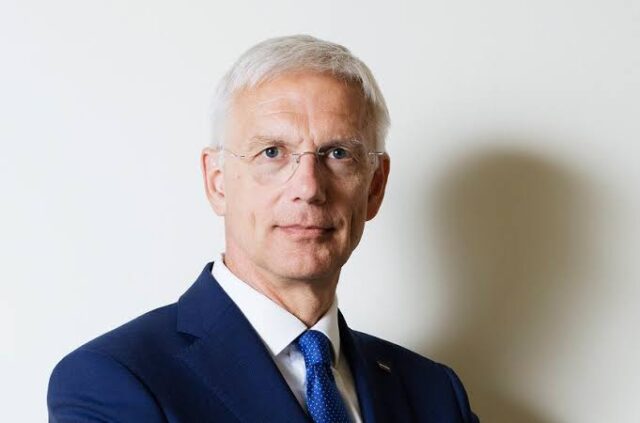Repost from: https://www.rferl.org/a/latvian-foreign-minister-ukraine-nato-fund-unity/32892072.html
BRUSSELS — Latvia’s foreign minister says a proposal to create a 100 billion euro ($107 billion), five-year fund for Ukraine would improve coordination among NATO members on providing military aid and send a signal to Moscow that those in the alliance are providing the aid together.
Krisjanis Karins told RFE/RL in an interview on April 4 on the sidelines of a NATO foreign ministers meeting in Brussels that the allies gave the green light to work out a plan on how the aid package would function.
Currently, the allies are working on an “ad hoc” basis in which various coalitions provide munitions, drones, demining equipment, and other aid, he said.
“That could be better coordinated to bring together the needs of Ukraine with the available resources that various NATO allies have,” Karins said.
Secondly, the 100 billion euro ($108 billion) aid proposal would give Ukraine certainty and long-term stability of financial assistance, he said.
The aid may come as weapons or as ammunition, but it might also be a direct payment from NATO.
“I think it’s extremely important to give a clear signal to our Ukrainian friends and to the soldiers on the front, but also a very clear signal to Moscow, that Moscow sees that it’s not just individual countries, but it actually is all of us together,” he said.
NATO defense ministers agreed on April 3 to start planning for a greater role in coordinating military aid to Ukraine. But it is far from clear whether the proposed fund would be accepted by all the alliance’s members, which is required under its decisions-by-consensus rule.
Karins said there’s still a few months until the NATO summit in July in Washington, and he hopes that the way in which the fund would function could be worked out by then.
The Latvian foreign minister also said it remained an open question whether the 100 billon euro fund would be in addition to money already contributed, would come from members fulfilling the defense-spending baseline of 2 percent of gross domestic product (GDP) that was agreed years ago, or would be completely new funds.
Latvia, for example, has already pledged to spend 0.25 percent of the country’s GDP on supporting Ukraine, and it’s not clear whether pledges that have not yet been realized would be included as a member country’s contribution to the fund or if there would be additional new money.
Karins said he has advocated for fairer burden sharing to aid Ukraine that would involve a percentage of GDP. He acknowledged that the 0.25 percent of GDP that Latvia has pledged would be a lot smaller sum than 0.25 percent of GDP that countries such as France or Germany would provide, “but it feels the same.”
All countries are united on aiding Ukraine, which is “tremendously good news,” he said. “What we need to do is to decide on how that aid [would look] in the longer term so that there’s stability and predictability.”
Some diplomats have described the proposed fund for Ukraine as a way to bring responsibility for aid to Kyiv into NATO proper amid worries about the future of the alliance if former U.S. President Donald Trump wins the November election. Trump has said if elected, he would “fundamentally reevaluate” NATO’s purpose and mission.
The coordination of military support under the proposed 100 billion euro fund would be less dependent on the United States, which under a new Trump administration would likely be less forthcoming with aid. Trump, a Republican, has said that, if he is elected, he would “not give a penny” to Ukraine and would demand that European allies reimburse the United States for the cost of rebuilding its military stockpiles.
Ukraine and its European partners have also been frustrated by a multibillion-dollar Ukraine aid package that has been held up in the U.S. Congress for more than six months by Republican members. (Radio Free Europe)
